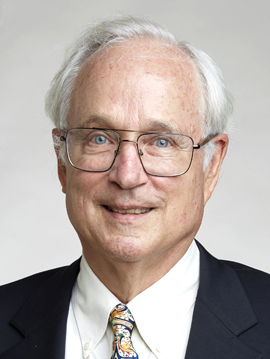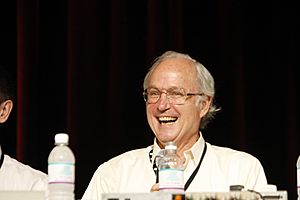Butler Lampson facts for kids
Quick facts for kids
Butler Lampson
|
|
|---|---|

Lampson in 2018
|
|
| Born | December 23, 1943 Washington, D.C.
|
| Education | Harvard University (BA) University of California, Berkeley (MS, PhD) |
| Known for | SDS 940, Xerox Alto |
| Awards |
|
| Scientific career | |
| Fields | Computer science |
| Institutions | University of California, Berkeley Xerox PARC Digital Equipment Corporation Microsoft Massachusetts Institute of Technology |
| Thesis | Scheduling and Protection in an Interactive Multi-Processor System (1967) |
| Doctoral advisor | Harry Huskey |
Butler W. Lampson (born December 23, 1943) is a famous American computer scientist. He is well-known for helping to create and improve personal computing. This means he played a big part in making computers that people could use on their own, rather than just huge machines for big companies.
Contents
Early Life and Learning
Butler Lampson went to the Lawrenceville School when he was younger. He later received a degree in physics from Harvard University in 1964. After that, he earned his PhD in electrical engineering and computer science from the University of California, Berkeley in 1967.
Building the Future of Computers
In the 1960s, Butler Lampson was part of a project called Project Genie at UC Berkeley. Here, he and others helped create the Berkeley Timesharing System. This system allowed many people to use the same computer at the same time.
The Birth of Personal Computers
In 1971, Lampson became one of the first members of Xerox PARC. This was a special research center where many new computer ideas were born. In 1972, he wrote a famous note called "Why Alto?". This note shared his idea for a personal computer.
Just a year later, in 1973, the Xerox Alto was created. This computer was very special. It had a three-button mouse and a screen that showed a full page of text. Many people consider the Xerox Alto to be the first true personal computer. It showed how computers could work with a graphical user interface (GUI), which is what we use today.
Lampson also helped create a plan called "Wildflower" for future computers at Xerox PARC. Many computers followed this plan, including the "Dandelion" (used in the Xerox Star) and the "Daybreak" (Xerox 6085).
Other Amazing Inventions
At Xerox PARC, Lampson worked on many other important technologies. These include:
- Laser printers: These printers use lasers to create high-quality images and text.
- Ethernet: This is a way for computers to connect and share information in a local area network (LAN). It's how many computers in an office or home connect to each other and the internet.
- Bravo: This was one of the first programs that let you see exactly what your document would look like when printed. This is called "What You See Is What You Get" (WYSIWYG).
- He also helped design important programming languages like Euclid.
After his time at Xerox PARC, Lampson worked at other big technology companies. He joined Digital Equipment Corporation in 1983 and then Microsoft Research in 1995. Since 1987, he has also been a professor at the Massachusetts Institute of Technology (MIT).
Awards and Recognitions
Butler Lampson has received many important awards for his work in computer science:
- In 1984, he was chosen as a member of the National Academy of Engineering.
- In 1992, he won the prestigious ACM Turing Award. This award is like the Nobel Prize for computer science. He won it for his work on personal computing and other computer science ideas.
- In 2001, he received the IEEE John von Neumann Medal.
- In 2004, he won the Charles Stark Draper Prize for his work on the Xerox Alto.
- In 2005, he became a member of the National Academy of Sciences.
- In 2006, he was recognized by the Computer History Museum for his important contributions to computers.
- In 2018, he was elected as a Foreign Member of the Royal Society, a very old and respected scientific group in the United Kingdom.
Butler Lampson's work has truly shaped the way we use computers today, from the personal computer on your desk to the networks that connect us all.
Quotes
Butler Lampson is often linked to the saying, "Any problem in computer science can be solved with another level of indirection." This means that sometimes, adding an extra step or layer can help solve a complex problem. However, Lampson himself has said that David Wheeler actually came up with this quote.
See also
 In Spanish: Butler Lampson para niños
In Spanish: Butler Lampson para niños


